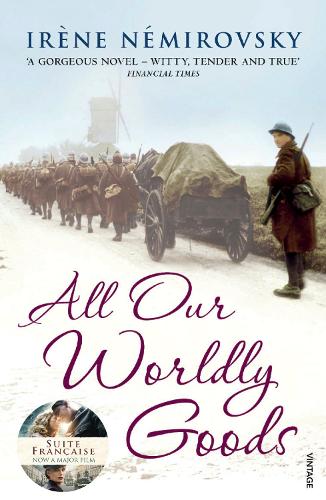
All Our Worldly Goods
(Paperback)
Publishing Details
All Our Worldly Goods
By (Author) Irne Nmirovsky
Translated by Sandra Smith
Vintage Publishing
Vintage
1st September 2009
United Kingdom
Classifications
General
Fiction
843.912
Physical Properties
Paperback
272
Width 129mm, Height 198mm, Spine 17mm
192g
Description
Reads like prequel to Suite Fran aise, but is a perfect novel in its own right - a gripping story of family life, of money and love, set against the backdrop of France in two terrible world wars. From the author of the bestselling Suite Fran aise. Pierre and Agn s marry for love against the wishes of his parents and the family patriarch, the tyrannical industrialist Julien Hardelot, provoking a family feud which cascades down the generations. Even when war is imminent and Pierre is called up, the old man is unforgiving. Taut, evocative and beautifully paced, All Our Worldly Goods points up with heartbreaking detail and clarity how close were those two wars, how history repeated itself, tragically, shockingly... 'A remarkable novel...beautifully translated... Her voice, compassionate yet always shrewd, with its sharp portrait of France at war and during the optimistic and confused Twenties and early Thirties, is always distinctive' Literary Review
Reviews
A gorgeous novel - witty, tender and true * Financial Times *
A remarkable novel...beautifully translated... Her voice, compassionate yet always shrewd, with its sharp portrait of France at war and during the optimistic and confused Twenties and early Thirties, is always distinctive * Literary Review *
Nmirovsky's great bourgeois tragedy is modest in scale but epic in scope. Her highly distinctive style, the delicate but relentless accretion of finely observed detail, produces a story in which universal cataclysm mirrored in apparently insignificant personal destiny, to extraordinary resonant effect -- Jane Shilling * Sunday Telegraph *
A coolly crafted traditional family novel -- A S Byatt * Guardian *
Nmirovsky's last stories are a living history of the occupation, written in real time * Sunday Times *
Author Bio
Ir ne Nemirovsky was born in Kiev in 1903, the daughter of a successful Jewish banker. In 1918 her family fled the Russian Revolution for France where she became a bestselling novelist, author of David Golder, Le Bal and other works published in her lifetime or soon after, as well as the posthumous Suite Fran aise and Fire in the Blood. In July 1942 she was arrested by the French police and interned in Pithiviers concentration camp, and from there immediately deported to Auschwitz where she died in August 1942.
